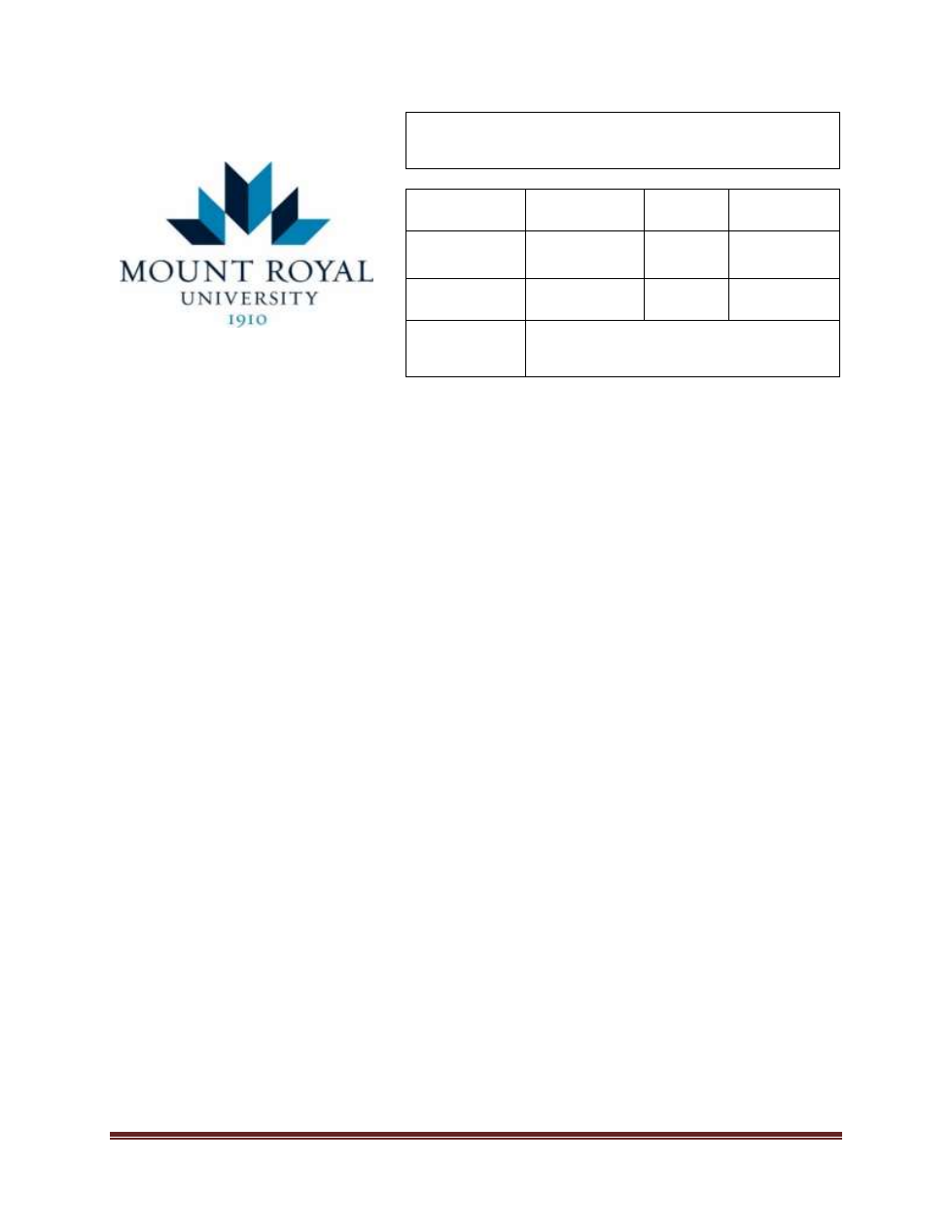
General Education Policy – February 25, 2016
Page 1 of 7
GENERAL EDUCATION POLICY
Policy Type:
Academic
Initially
Approved:
January 1, 2008
Policy Sponsor:
Provost & Vice-
President,
Academic
Last
Revised:
February 25,
2016
Primary Contact: Vice-Provost &
AVP Academic
Review
Scheduled:
September 1,
2025
Approver:
General Faculties Council
A.
SCOPE
This Policy applied to all credit programs at Mount Royal University.
B.
POLICY STATEMENT
1.
GENERAL EDUCATION
General Education is the part of the curriculum shared by all students that is primarily
responsible for meeting the requirement for liberal education. Courses taken to satisfy this
component of the program may not also be used to satisfy requirements in either of the other
categories.
The following arrangements with respect to General Education apply to all degree, applied
degree and diploma programs. The arrangements derive from the Final Report of the Ad
Hoc Committee on General Education (2006) and recommendations of the General
Education Review Committee (2015) as accepted by General Faculties Council.
1.1
Thematic Clusters
The General Education curriculum is structured around four thematic clusters. The
general descriptions and goals of each of the thematic clusters are set out below.
These descriptions and goals are the guidelines by which General Education
courses are to be developed and approved.
a. Cluster 1: Numeracy and Scientific Literacy
These courses aim to develop an understanding of the nature and methods of
subjects in the health sciences, natural sciences and mathematics, as well as
assuring that students have the opportunity to acquire essential mathematical
skills needed in post-secondary studies. The goals of study within this cluster
are:
i.
basic mathematical and statistical skills requisite to success in
undergraduate level study and in everyday life;
ii.
a foundational understanding of the nature of mathematical enquiry;

General Education Policy – February 25, 2016
Page 2 of 7
iii.
an understanding of the role of mathematics and statistics as reasoning
tools which can be applied to other fields of study;
iv.
an understanding of, and foundational facility with, the scientific method;
v.
an understanding of the role of mathematics and science in the
development and application of technology;
vi.
an understanding of the scope of the major natural sciences disciplines;
vii.
a basic knowledge of the major concepts and theories within one or more
of the major natural science disciplines;
viii.
an appreciation of the potential and limitations of science and technology;
ix.
the development of skills in the retrieval and evaluation of scientific
information.
b. Cluster 2: Values, Beliefs and Identify
These courses provide students with the opportunity to critically explore the
values, beliefs, and ideas that shape, and are shaped by, human experience.
The understandings and senses of meaning expressed by individuals,
communities, and societies through their art, music, literature, philosophy, and
critical thought will be explored. Students will also have the opportunity to
explore the various media through which cultural expression takes place. They
will consider the impact of technology upon both the media and the content of
cultural expression. The goals of study within this cluster are:
i.
an understanding of the principal ideas and cultural traditions that have
informed modern Canadian society;
ii.
an appreciation of the diverse cultural traditions found across the world;
iii.
the study of texts, works of art, and bodies of thought that are of historical
significance in the development of Western and non-Western cultures;
iv.
the study of texts, works of art, and bodies of thought that are significant
in contemporary perceptions of the character of both Western and non-
Western cultures, and that are significant in the interactions of Western
and non-Western cultures;
v.
an appreciation of influential religious, philosophical, and ethical
perspectives;
vi.
an appreciation of contemporary understandings of the nature and
development of personality, personal identity, and social interaction as
expressed in psychology, philosophy, art, and other subjects and
practices;
vii.
an understanding of the principal methods of study in the humanities and
social sciences including relevant research and information retrieval skills.

General Education Policy – February 25, 2016
Page 3 of 7
c. Cluster 3: Community and Society
Through these courses students will explore the complex interlocking of interests
and relations that constitute social life from the level of the local community
through the globalized network of societies. Through the study of the interlocking
of material, moral, and political factors informing society at all levels, students
will have the opportunity to acquire skills enabling them to both understand and
act in the world that they will be inhabiting as citizens. The goals of study within
this cluster are:
i.
an understanding of research methods in the study of social, political, and
commercial activities including the development of relevant research and
information retrieval skills;
ii.
an appreciation of the factors and processes that shape the character of
societies and communities;
iii.
an understanding of Canada’s political, strategic, economic, and cultural
place within the world community;
iv.
an understanding of the development and functions of the key political,
social, and economic institutions and practices within the local community,
nationally, and in the wider world;
v.
a recognition of the moral imperatives arising from the human rights and
the social conditions of others;
vi.
an understanding of the legal rights and moral obligations of individuals
and organizations within various commercial, social, political and
ecological contexts;
vii.
an understanding of theoretical and ideological perspectives on the
purposes and roles of social, economic, and political systems, institutions
and processes,
viii.
an understanding of the historical and ideological contexts of relations
among the various nations and communities in the modern world;
ix.
an understanding of debates about the quality of life within society
including (but not confined to) such matters as: health issues,
development and the natural environment, economic conditions, political
participation, the application of new technologies, and cultural change.
d. Cluster 4: Communications
These courses focus on the development of an undergraduate level of
proficiency in written and oral communication across a range of media. They
further facilitate the development of a capacity for critical reflection upon various
communication media and their uses. This cluster of courses also provides the
opportunity for study in languages other than English. The goals of study within
this cluster are:
i.
the assurance of undergraduate level English composition writing skills;

General Education Policy – February 25, 2016
Page 4 of 7
ii.
the capacity to comprehend, interpret, and critically engage a broad range
of texts (understood broadly to include fiction and non-fiction presented
through various media);
iii.
an understanding of, and facility in, the conventional uses and applications
of principal forms of rhetoric (including listening, speaking, writing, and
visual communication);
iv.
the opportunity to gain a facility in the written and spoken use of languages
other than English;
v.
an understanding of the wider cultural and social significances of various
forms of media and the impact of technologies upon them.
1.2
Levels (Tiers) of Study
There are three levels of General Education curriculum. In consultation with faculty
or course originator, the University General Education Curriculum Committee will be
responsible for identifying the appropriate level of study for General Education
courses, subject to the approval processes of the institution.
a. Foundation Level (Tier 1)
i.
A principal aim of this element of General Education is to develop
fundamental skills and broad bases of knowledge. The primary focus
should be on the attainment of essential higher level learning skills and
capacities, and of an awareness of various conventional modes of thought.
ii.
An undergraduate level English language composition course is to be
offered at the foundation level in the “communications” thematic cluster.
iii.
The foundation level courses in the “Numeracy and Scientific Literacy,”
“Values, Beliefs and Identity” and “Community and Society” clusters may
have interdisciplinary or cross-disciplinary content. These courses strive
to provide students with essential skills and an appreciation of the range
of subjects and disciplines arising from their respective cluster themes.
iv.
In order to preserve the integrity of Mount Royal’s General Education
provision, all foundation level courses within a given thematic cluster will
strive to meet the same general cluster goals.
v.
Foundation courses would normally be numbered consistent with the
institution-wide course numbering policy indicating a junior level course.
vi.
There will be a maximum of three foundation courses in each cluster.
vii.
The foundation courses in the Numeracy and Scientific Literacy and
Communications clusters must normally be taken within a student’s first
ten courses.
viii.
The foundation courses in the Values, Beliefs and Identity and Community
and Society clusters must normally be taken within a student’s first twenty
courses.

General Education Policy – February 25, 2016
Page 5 of 7
b. Second Level (Tier 2)
i.
It is desirable, but not mandatory, that second level General Education
courses should be taken only after completing the foundation level course
within the same thematic cluster.
ii.
After completing the foundation level and second level courses, students
will have had some engagement with all of the identified goals of each of
the thematic clusters.
iii.
Second level courses would normally be numbered consistent with the
institution-wide course numbering policy indicating a junior or senior level
course.
c. Third Level (Tier 3)
i.
This level of General Education study would normally apply only to
baccalaureate degree programs.
ii.
Third level courses would normally be numbered consistent with the
institution-wide course numbering policy indicating a senior level or
honours/capstone level course.
1.3
General Education Management and Development
Mount Royal’s General Education requirements are to be developed within the
existing curriculum approval process and are subject to the institution’s other
curriculum and administrative policies.
1.4
Review and Amendment of General Education
General Education is subject to the same periodic program review policy as other
academic programs at MRU.
1.5
Program Exemptions from Diploma Program Definition Requirements
a. In cases where there are demonstrable accreditation requirements that would
necessitate an exemption from General Education requirements, diploma
programs may apply to the General Faculties Council for a modification of the
diploma program definition requirements. Where such modifications are
necessary, they should be made while retaining as much of the normally
prescribed program definition requirements as possible. Accordingly,
modifications may assume the forms set forth below. A program should adopt
the first of the three listed modifications below that allows it to meet its
professional or accreditation requirements:
i.
While maintaining the requirement for five general education courses
with at least one course from each cluster, a program may require that
its students take up to four specified courses within the General
Education provision. This core program specification of four General
Education courses notwithstanding, students will be expected to adhere
to the General Education thematic cluster distribution requirements.
ii.
While maintaining the requirement for five general education courses, a
program may require that its students take up to four specified courses

General Education Policy – February 25, 2016
Page 6 of 7
within the General Education provision. Courses so specified by the
program will not be subject to the General Education thematic cluster
distribution requirements.
iii.
A program may require a minimal reduction of the number of electives
and/or required General Education courses in order to accommodate
additional core courses necessitated by professional requirements.
1.6
Program Exemptions from Baccalaureate Degree Definition Requirements
In cases where there are demonstrable accreditation requirements that would
necessitate an exemption, degree programs may apply to General Faculties Council
for a modification of the baccalaureate degree definition requirements. Where such
modifications are necessary, they should be made while retaining as much of the
normally prescribed program definitions requirements as possible.. Accordingly,
modifications may assume the forms set forth below. A program should adopt the
first of the five listed modifications below that allows it to meet its professional or
accreditation requirements:
a. While maintaining the required course distribution of up to 65% in the core, 25%
in General Education, and 10% as electives, a program may require that its
students must take up to four specified courses within the General Education
provision. This core program specification of four General Education courses
notwithstanding, students will be expected to adhere to the General Education
thematic cluster distribution requirements.
b. While maintaining the required course distribution of up to 65% in the core, 25%
in General Education, 10% as electives, a program may require that its students
must take up to four specified courses within the General Education provision.
Courses so specified by the program will not be subject to the General Education
thematic cluster distribution requirements.
c. A program may require that its students take 75% of their courses within the
program core, and 25% within the General Education provision. Students will
be expected to adhere to the General Education thematic cluster distribution
requirements.
d. A program may require that its students take 75% of their courses within the
program core, and 25% within the General Educational provision, of which up to
two courses may be specified by the core program requirements.
e. A program may require a minimal reduction of the number of electives and/or
required General Education courses in order to accommodate additional core
courses necessitated by professional requirements.
C.
DEFINITIONS
(1)
Policy:
means the General Education Policy
(2)
University:
means Mount Royal University
D.
RELATED POLICIES
•
Program Definitions Policy

General Education Policy – February 25, 2016
Page 7 of 7
E.
RELATED LEGISLATION
F.
RELATED DOCUMENTS
G.
REVISION HISTORY
Date
(mm/dd/yyyy)
Description of
Change
Sections
Person who
Entered Revision
(Position Title)
Person who
Authorized
Revision
(Position Title)
01/22/2009
Split Program
Definitions and
General Education
Policy into two
separate policies.
All
02/25/2016
Significant changes
included
“demonstrable
accreditation
requirements” and
changes to course
distribution to
program core, gen
ed and electives
B.; 1.2; 1.4; 1.5; 1.6 Director, University
Secretary
08/31/2017
Editorial – formatting
to new template
01/29/2020
Editorial
Template Update
Policy Specialist
University Secretary
02/11/2021
Editorial
Title Updates
University Secretary University Secretary






